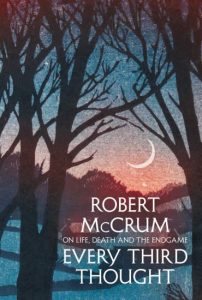 Falls are common among the elderly, but rare are well-written accounts describing the shock and loss of confidence that result, and still rarer those that articulate the intimations of mortality that follow afterwards. Robert McCrum wrote a moving memoir about his stroke when he was 42, My Year Off, and he has now followed that in his early 60s with a searching, challenging, and ultimately moving discussion about his own intimations of mortality.
Falls are common among the elderly, but rare are well-written accounts describing the shock and loss of confidence that result, and still rarer those that articulate the intimations of mortality that follow afterwards. Robert McCrum wrote a moving memoir about his stroke when he was 42, My Year Off, and he has now followed that in his early 60s with a searching, challenging, and ultimately moving discussion about his own intimations of mortality.
The fall that sparks this discussion is described in chapter 2, and in the following chapters there are useful descriptions of the way our culture worships youth and health, paying little attention to our impermanence. As is usual with McCrum, he peppers his writing with literary allusions and quotations, so that the discussion is situated in the reflections of great writers’ on human vanity and weakness. His fall on a Notting Hill pavement came during a period when McCrum had become very conscious of the illnesses and frailties of many friends, and among seniors and contemporaries in his literary world. So his narrative is a collection of intimate portraits of colleagues and friends going through bereavement, or fighting cancer, and benefits from his conversations with them. Some of the people that feature, like Chris Tarrant, had also experienced a stroke, but McCrum also deals with the other illnesses of old age, such as sight loss, cancer (especially breast cancer and leukaemia), Parkinson’s Disease, and dementia. Two chapters analyse dementia – and how it is has assumed a terror greater than that of dying – through the witness of such people with dementia as Discworld author Terry Pratchett, carers for people with dementia like John Bayley (for Iris Murdoch) or actor Timothy West (for Prunella Scales), and doctors dealing with the condition.
After an interesting chapter on the long tradition on learning to die well through living well, there is a moving and curiously entertaining chapter on ‘Last Words’. Just as the biographer Boswell had visited philosopher David Hume on his death-bed, in his turn McCrum interviews friends and colleagues as they approach their end. Oliver Sacks and Clive James have recently written much in their final illnesses. In addition to relating their words and opinions, he mines the huge literary resources on this topic, including authors such as Montaigne, C.S.Lewis, Dylan Thomas, John Donne and, of course, Shakespeare. And children’s literature is also not far away, as the literary sources of comfort that people go to when they are dying – Lewis Carroll, Edward Lear, and so on.
The pattern is for the author to match the opinions and experiences of the layfolk who encounter diseases of old age, with those of the doctors and researchers who know more about the clinical science of each condition. Except of course, that each of these doctors is themselves ageing, and they have their own personal attitude to the inevitable ailments of old age, and their own recipes for postponing them. McCrum argues that his structure vaguely follows the pattern of Kubler-Ross’s stages of dying, from denial through to acceptance. But his final chapter is about his own personal experience of ageing, and how he is still relishing future adventures and relationships. There is a telling misprint in my copy, when he relates how his ex-wife moves back to New York in the same month as his sixtieth birthday – except that it is spelled ‘sixteenth’. Wishful thinking! And fitting in a chapter that shows that for all McCrum’s reflection on last things, he is still relishing more, and perhaps, like us all, in denial.
Robert McCrum (2017) Every Third Thought: On Life, Death and the Endgame, London, Picador